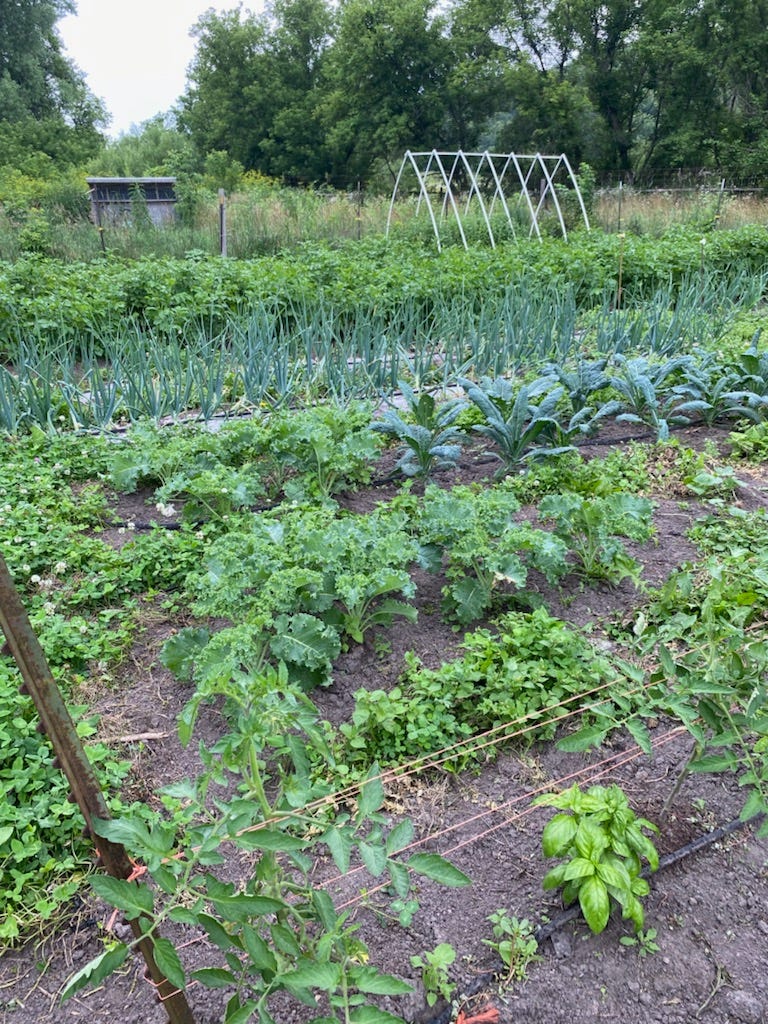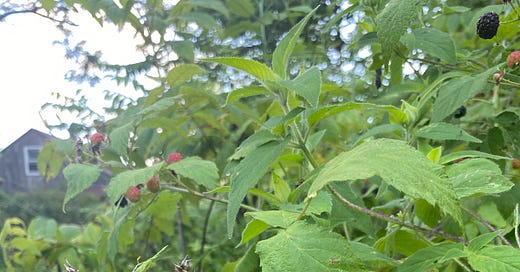
Several years ago, we were emailed by a reputable company to do a cooking commercial for them, for a certain nationally known hotdog. They wanted a farm family to be in the commercial, and use the farm as a cooking-outdoors backdrop, complete with a grill, a sunset, and our vegetables. Being one that is constantly wanting my ethics to overpower anything else, and wanting no part in a greenwashing campaign to sell food from factory farms, I said no. I emailed the PR woman and said that we didn’t support industrial meat. I went on a gentle rant about climate change, talked about how we farmed, how we were against CAFOs, talked about how the values just didn’t line up. “Actually, (name of big corporate meat company) hotdogs are very clean!” She emailed back chirpily, without further elaboration of what that even meant.
I have thought about that commercial and how much it would have paid us, especially when I am feeling really down. While there were many pluses about travelling in our bus (working on farms, changing our backyard and window view every few days, travelling and seeing new places), many things were hard for me about our sardine can of an RV, like how we didn’t have hot water and how we had to work our asses off paying off our debt. I think of how much easier we could have had it at paying off our debt if we had done that dumb commercial, and then feel like an idiot for saying no.
That said, I would never want to encourage or be involved in the advertisement that helped suffering animals be put on peoples’ plates. There was a period where plenty of ink was spilled about the horrors of eating foie gras, the overly-fatty liver dish produced by overfeeding a duck. Restaurants were boycotted that served it, but I found the whole thing bizarre. Where was the outrage, I thought, from restaurants serving fried chicken? Unless explicitly said it was bought from a humane, grass-based farm, that chicken lived just as (if not more) heinous of a life as the overfed duck, squished inside a metal cage, in a huge, polluting factory farm. It is why I do not order chicken (or other meat) in a restaurant, and why I just always want to cook at home, and why we are planning to raise our own animals for meat as soon as we can. (The farm in Utah really sold me on raising rabbits, though chickens are going to be probably what we start first).
I do think about what happened to us at our farm in terms of greed, and how so many of the world’s problems really stem from greed, and is dictated by money, and that how, even though we might not have much money, we at least stood by our ethics; when you live that way, you can at least not feel guilty about how you lived your life, and there is something to that.
During COVID, NPR had something called a “joy-generator”, and encouraged people who feel down to take five minute walks outside. To combat stress and sadness, the joy-generator encouraged looking at parts of nature and feeling awe about even the smallest details (the perfect spots on a ladybug’s back, the pistil of a tulip). I also find that, given the dark state of our world and seeing the worst in humanity flare up so strongly, it is helpful to cherry-pick some hopeful news out there; humpback whales, and most recently, dolphins, were spotted in the Hudson River and the East River off of New York City, signifying water quality improvement. Nature thriving can elevate one’s mood, like it does mine, even if it seems to be something ladybug-spot small.
Our new garden (our kids have dubbed it “Tiny Radical Root Farm”) is one of those ladybug spots right now. Inside, my soul is crying out to grow more food and feed way more people. With so many terrible things, from terrifying supreme court decisions to multiple mass shootings to police killings of unarmed Black people to the planet rapidly dying a pollution-induced death, life can look like a horror show, so if there is any drop in the bucket we can do, it would be good to do it; I had high hopes of farming this year as a family and grow a lot of food for many people. But we got here on June 5th, and this garden was what we could do, and for now, it is good enough. I weeded a very small bed of carrots the other day, just by hand, by having my knees and fingers dig in the black Wisconsin earth, and I felt that awe, the awe that such a thin, spindly green sprout can become a large, nourishing carrot. It really is such a miracle.
What do you do with regret, with wishing things could be better, in both your life and in the world? You can raise kids, raise carrots, find butterflies, look at tiny spots in nature. You can feel disappointed, but you can at least know you tried your best and did the best that you could, and lived as ethically and kindly as possible. It’s the long-game stuff.
Here is, as promised, one of the “after” pictures of part of what the garden looks like. For the plant and farm nerds out there, we are practicing a no-till garden with dutch white clover foot paths to fix the soil’s nitrogen, promote pollination and sequester the carbon. I stupidly sold our broadfork when we left our farm (I am getting another one ASAP!), so we had very minimal tools to work with—just a regular garden fork and the weeding tools we kept. Next summer, no matter where we are, I am planning on us growing much more, but for now, I am practicing on feeling satisfied with where we are now.

Recently, we joined this county’s 4-H program. We went to a meeting with a potluck that had multiple jello salads, and met many other families, many that are farmers. It was weird to talk tractors with so many other people (when we were not at an event like a farming conference), and find that commonality with so many locals, showing me that even underneath all of the bowls of quivering neon-colored jello, you can still find that common base. These families were mostly conventional farmers, or conventional farmworkers, working on other peoples’ farms, but still discussed the same work and stress issues that all farmers share. These families felt different from us but also relatable, with similar work and financial hardships, and I suppose if asked, many would definitely have done a hot dog commercial. I wouldn’t blame them, and maybe we should have done one too. I guess we would have been more financially comfortable back then, could have paid some of our loans and investments a little easier, maybe would have an easier time now. Right now, though, I think I am ok with being paid more in joy-generating awe than money.
From the Farm Kitchen:
We are growing some things that I am now harvesting, but I am also getting vegetables from my part-time job at the farm I am working at. Though I do not like turning on the oven in the summer, I think I mentioned that our weekly pizza night is back, now that Alex works at Meadowlark, and we have a sourdough starter that we made our pizza with (first pizza in the house!) with whatever vegetables we had. I talked about BLTs in the last newsletter, and I was remembering a BLT pizza I had somewhere that used romaine lettuce on top. We didn’t do that, but we did use lamb’s quarters, chard and kale as toppings.
From the Farmhouse:
Projects in the works and still dealing with emotions, but the house, despite leaky and old, is actually very charming with a good energy. You take the good and the bad! I made the boys’ room and our room as cozy as I could, and I love that they are small and right next to each other. It is a great transition from being so tight in the RV bus to having small rooms next door. It would feel cramped to some, I suppose, but it is pretty perfect for us. I will let the projects be known soon!




Thanks for generating Joy for us with every writing you do! I’m trying to imagine Alex on TV smothering a hot dog in a big bottle of sugar filled commercially made ketchup and I just can’t see it! You’re better off holding to your principles then forever feeling the guilt of selling out the poor pigs.